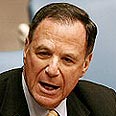
"The situation in Lebanon, between the Syrians and the Iranians, seems very bad. Security Council Resolution 1701, which ended the Second Lebanon War, is not being implemented. What is extremely alarming is that Iran is on our northern border, and in a sense on our southern border as well," he said.
The Israeli stance, however, is to keep quiet in a bid to allow the world to deal with the situation created in the north.
Prime Minister Ehud Olmert, Foreign Minister Tzipi Livni and Defense Minister Ehud Barak have decided that Israel will not lead any moves in regards to the incidents in which Hizbullah used its weapons inside Lebanon.
However, in a discussion held Sunday at the cabinet meeting following a briefing by Military Intelligence Director Amos Yadlin, many ministers expressed their concern over the situation.
The fear is that Hizbullah is positioning itself as the ruling element in Lebanon, after completing its armament and increasing its power since the 2006 war. Olmert and Bush are expected to discuss the developments in Beirut in their upcoming meetings in Israel.
According to Gillerman, "Resolution 1701 included important elements, but kidnapped soldiers Eldad Regev and Ehud Goldwasser were no released, the arms embargo on the militias headed by Hizbullah is not being implemented, and Hizbullah has not been disarmed.
"I sincerely hope that following the recent events in Lebanon, the international community will make sure this happens, not only for our sake, but for the entire region's sake," he said.
"Weapons are being funneled to Hizbullah, while Lebanon is torn and bleeding. This is the continuation of a 40-year tragedy, of civil wars and takeover attempts by different elements.
"The international community should act, for the sake of Lebanon and for the sake of the entire region, in order to stop the dangerous deterioration and turn the clocks back," he added.
Gillerman is expected to complete his UN tenure at the end of July.















